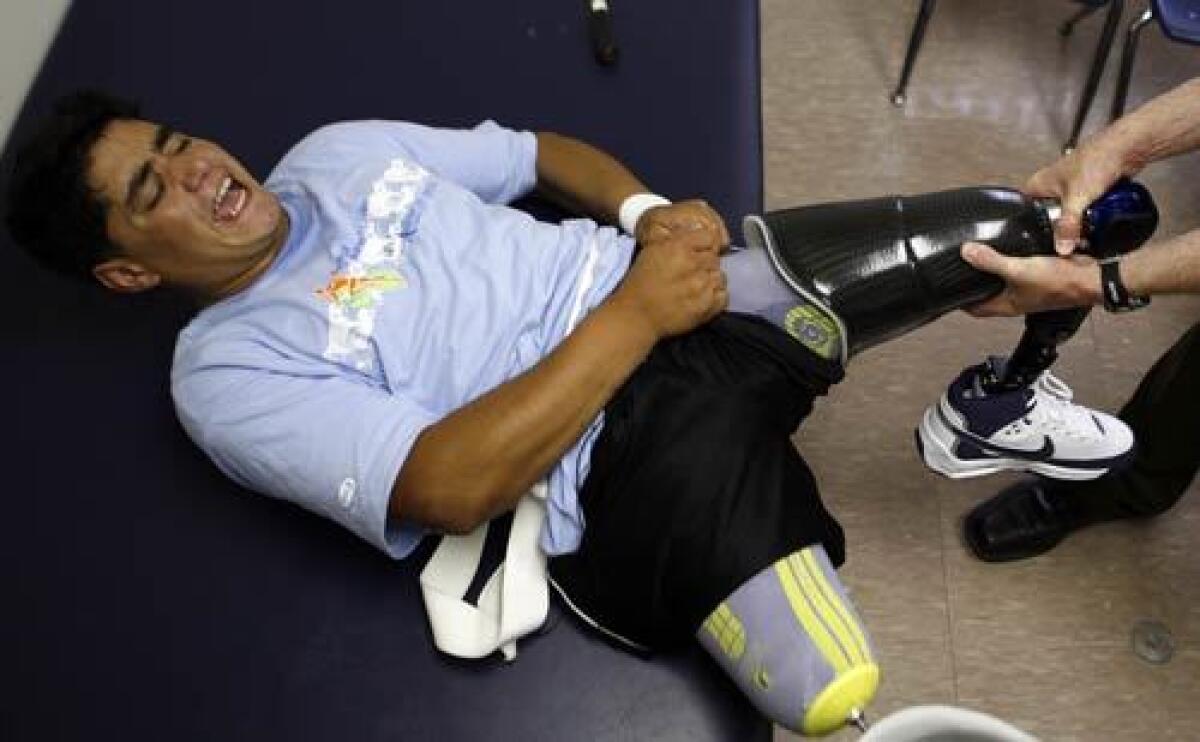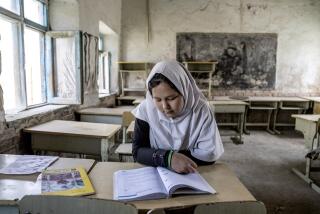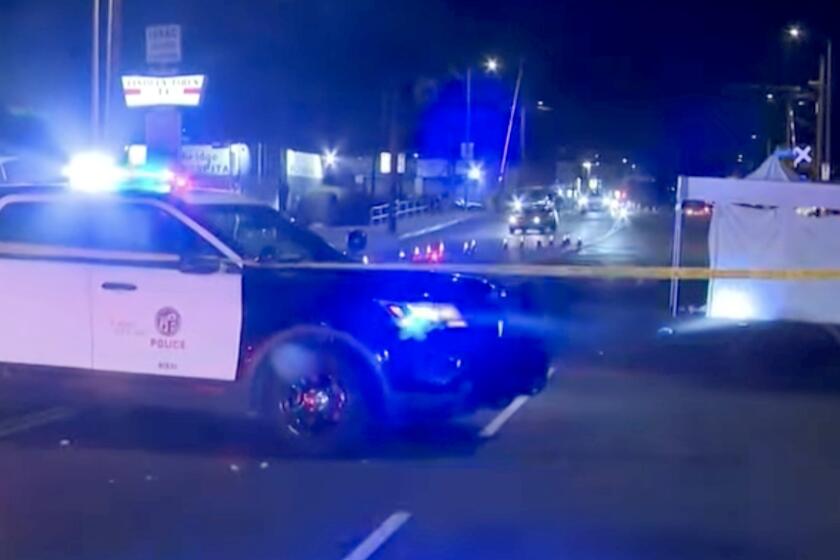Land mines took Afghan youth’s legs but not his heart

For those at Loma Linda University who still haven’t met the cheerful amputee tooling about campus in his wheelchair, he’s made up business cards: “Visitor from Afghanistan Mohammad Malek,” they say, followed by a Kabul phone number.
Not that he really needs them.
In recent months, Malek, who was first profiled in January by The Times, has been transformed from a frightened teenager in a broken body into a popular, confident young man, attending school, learning English and living independently.
His physical recovery after land mines blew off his legs in Kabul has been remarkable -- but the biggest changes may have taken place in his mind.
Things he had never dreamed of, ways of life he never knew existed, have been revealed to him, and Malek, 19, has begun thinking the unthinkable -- that maybe stumbling into that minefield four years ago was actually a stroke of luck.
“My legs are missing, but I am wiser about the world,” the Dari-speaking teen said through a translator.
“It is a blessing to have a full body, but I feel lucky to have my mind. I feel my mind has been developed and my way of looking at life has changed. I see the things people do here, and I want to learn as much as possible.”
Malek tripped the mines while gathering firewood for his family.
He was taken in by Loma Linda University Medical Center as a charity case after Mark Ward, an officer with the U.S. Agency for International Development, met him in a Kabul hospital. Ward was reduced to tears as he watched then-15-year-old Malek stagger across the floor on crude prosthetic legs with jagged bits of bone piercing his skin.
Extensive surgeries
Since November, Malek has undergone extensive surgeries at Loma Linda to smooth his leg bones, remove shrapnel from his arms and treat burns on his chest. He has also been outfitted with new prosthetic legs.
“As tragic as Malek’s accident was, he has youth and health on his side,” said Michael Davidson, clinical manager of the medical center’s Rehabilitation Institute. “He also has a drive that is very special. When he first got his legs, he walked home pushing his wheelchair.”
Malek practices each day. He makes long, ungainly strides around a physical therapy room, sweat pouring from his body as he hoists each 8-pound leg. He is tough enough to prefer them to the wheelchair.
“The wheelchair I don’t like,” he said in broken English. “The legs I like. I want to walk to go everywhere -- to the movies, to the restaurants, to the hotel. I want to sleep with the legs on.”
For months, he’s been lifting weights, swimming, playing volleyball and even surfing. A small army of newfound friends takes him to movies or on road trips around California.
If his life seems frenetic, it may be because time is short and he’s determined to make the most of it. Malek is expected to return next month to Kabul, where he lives with his parents and seven siblings in a small cinder block house.
Malek will take his legs and wheelchair with him, and Loma Linda hopes to arrange medical follow-ups as well.
Whenever he speaks to family members, they tell him not to waste any opportunity to learn. Despite his age, Malek has only a seventh-grade education. War and poverty kept his parents from getting even that far themselves.
‘Life was simple’
“Before, life was simple,” Malek said through a translator. “The only thing to worry about was food on the table, working and going to sleep. I’m OK with simple living, but I want to increase the quality of my life. I want an education.”
Ward, whose picture hangs on Malek’s wall, remains impressed with how he’s fared in this unfamiliar world.
“Malek’s grit and determination to walk again caught my attention when I first met him two years ago in Kabul,” he said in an e-mail. “He crossed that hurdle and set his sights on another. He, like so many young people in Afghanistan, wants to improve his education and bring prosperity to [his] country.”
Ward said he would work toward eventually getting Malek into a good university.
For now, Malek’s education begins each morning at Loma Linda Academy. The Seventh-day Adventist school, serving students in kindergarten through 12 grade, doesn’t grade him but lets him take classes primarily to improve his English.
“He asks a lot of questions and really gets something out of the whole social dynamic,” said teacher Elias Khoury, who has Malek in his health class.
“This school is a melting pot and he fits right in.”
Recently, Malek sat in Khoury’s class watching “Super Size Me,” a documentary about the perils of a fast-food diet.
“I used to like McDonald’s, but now I’m not sure,” he said.
Andrew Colón, 16, sat next to him. The two like to arm-wrestle, and Malek is the current champ.
“I know about Afghanistan and the war, but I never met anyone from there before,” Andrew said. “I wanted to know the reality of his life. He told us about the land mines and the accident.”
Malek raised his eyebrows and smiled.
“He’s my buddy,” he said. “He is teaching me Spanish.”
Malek then headed into art class, picking a spot near teacher Grace Ballou. A picture he drew of an airplane flying out of a mountain-ringed Kabul hung on the wall.
‘Very observant’
“That’s the plane that brought him here,” Ballou said. “He’s very observant.”
When Malek first arrived, he was accompanied by a chaperon.
But the older Afghan returned home in May, leaving Malek to live alone in a small university-owned apartment near the Loma Linda campus.
It’s full of sports equipment, fitness magazines and family pictures. But it’s not home.
“I feel lonely, but because I have a goal and because I am going to get a better life, I can handle it,” he said.
“When I came here, I was down and depressed. I went through all the surgeries and pain, but there are so many people here who have helped me forget the pain.”
He said he hopes to become a doctor and help his family and Afghan society recover from decades of strife. Still, he’s well aware that a war rages on.
‘A better society’
“When I was young, I wanted to fight, but I’m different now. I will talk to family and friends and say war is no good,” he said through a translator. “We need to build a better society, but I am kind of scared to go back and I fight with that fear.”
He battles loneliness with frequent visits to the Drayson Center, the university’s sports complex.
One of his friends there is Donald Hawecker, 43, who lost an arm and a leg after being hit by a truck while riding a bike in Riverside. He is also in a wheelchair.
The two endlessly joust.
“You’re slow, Malek!” Hawecker tells the fiercely competitive teen as he bats volleyballs back and forth.
“No, it’s not true!” bellows Malek, spilling out of his wheelchair, struggling for a save.
They bicker over Malek’s claim of having a girlfriend.
“What girlfriend? Since when?” demands Hawecker.
“No, I do,” Malek says. “She is a Navy girl and she’s teaching me Spanish -- vamanos, cabeza, taqueria, mucho.”
Hawecker guffaws and wheels to the sidelines.
“He’s a good guy,” he says of his young companion.
“I think it’s pretty incredible how well he does, given what he’s been through. I think God has given us both a second chance and neither of us wants to waste it.”
More to Read
Sign up for Essential California
The most important California stories and recommendations in your inbox every morning.
You may occasionally receive promotional content from the Los Angeles Times.










